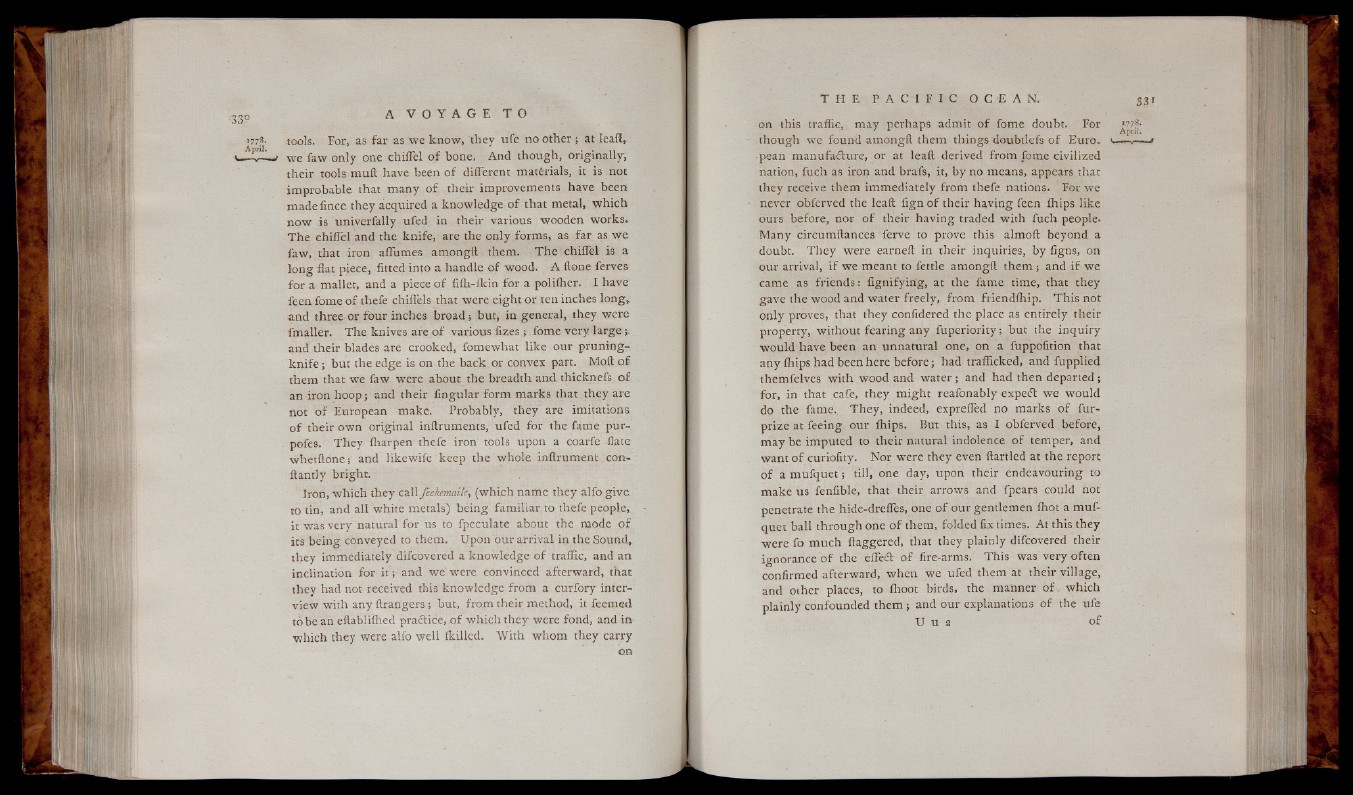
>77?- tools. For, as far as we kn ow, they ufe no o th e r ; at leaf!,
we faw only one chiiTel o f bone. And though, Originally,
their tools mull have been o f different materials, it is not
improbable that many o f their improvements have been
madeiince they acquired a knowledge o f that metal, w hich
n ow is univerfally ufed in their various wooden works.
The chiflel and the kn ife, are the only forms, as fa r as we
faw, that iron affumes amongft them. T h e chiffel is a
lon g flat piece, fitted into a handle o f wood. A ftone ferves
fo r a mallet, and a piece o f fifh-ikin for a poliíher. I have
feen fome o f thefe chifléis that were e ight or ten inches lon g ,
and three or four inches broad ; but, in general, they were
fmaller. T he knives are o f various fizes ; fome ve ry large
and their blades are crooked, fomewhat lik e our prun in g-
k n i f e ; but the edge is on the back or convex part. Moft o f
them that we faw were about the breadth and thicknefs o f
an iron h o o p ; and their Angular form marks that they are
not o f European make. Probably, they are imitations
o f their own original inftruments, ufed for the fame pur-
pofes. T h e y iharpen thefe iron tools upon a coarfe -líate
whetftone; and likewife keep the whole inftrument confian
tly bright.
Iron, which they call feekemaile, (which name they alfo give,
to tin, and all white metals) be in g familiar to thefe people,
it was very natural fo r us to fpeculate about the mode o f
its being conveyed to them. Upon our arrival in the Sound,
they immediately difcovered a knowledge o f traffic, and an
inclination for i t ; and we were convinced afterward, that
they had not received this knowledge from a curfory interview
with any ftrangers ; but, from their method, it feemed
tobe an eftablifhed practice, o f w hich th e y were fond, and in
which they were alfo well ikilled. With whom they carry
on
on this traffic, ma y perhaps admit o f fome doubt. For 777®-
though we found amongft them things doubtlefs o f Euro, v— „—
pean manufacture, or at leaft derived from fome civilized
nation, fuch as iron and brafs, it, b y no means, appears that
they receive them immediately from thefe nations. For we
never obferved the leaft fign o f their having feen ihips like
ours before, nor o f their ha vin g traded with fuch people.
Many circumftances ferve to prove this almoft beyond a
doubt. T h e y were earned: in their inquiries, b y figns, on
our arrival, i f we meant to fettle amongft th em ; and i f we
came as friends : fignifyirtg, at the fame time, that they
gave the wood and water freely, from friendffiip. T his not
only proves, that they confidered the place as entirely their
property, without fearin g any fuperiority; but the in quiry
would have been an unnatural one, on a fuppofition that
any ihips had been here b e fo re ; had trafficked, and fupplied
themfelves with wood and w a te r ; and had then departed;
for, in that cafe, they might reafonably expetft we would
do the fame. T h e y , indeed, exprefied po marks o f fur-
prize at feeing our Ihips. But this, as I obferved before,
ma y be imputed to their natural indolence o f temper, and
want o f curiofity. Nor were they even ftartled at the report
o f a m u fq u e t ; till, one day, upon their endeavouring to
make us fenfible, that their arrows and fpears could not
penetrate the hide-drefles, one o f our gentlemen fliot a mufquet
ball through one o f them, folded fix times. At this they
were fo much ftaggered, that they plainly difcovered their
ignorance o f the effecft o f fire-arms. This was ve ry often
confirmed afterward, when we ufed them at their village,
and other places, to fhoot birds, the manner o f . which
plainly confounded th em ; and our explanations o f the uf©
U u a o f